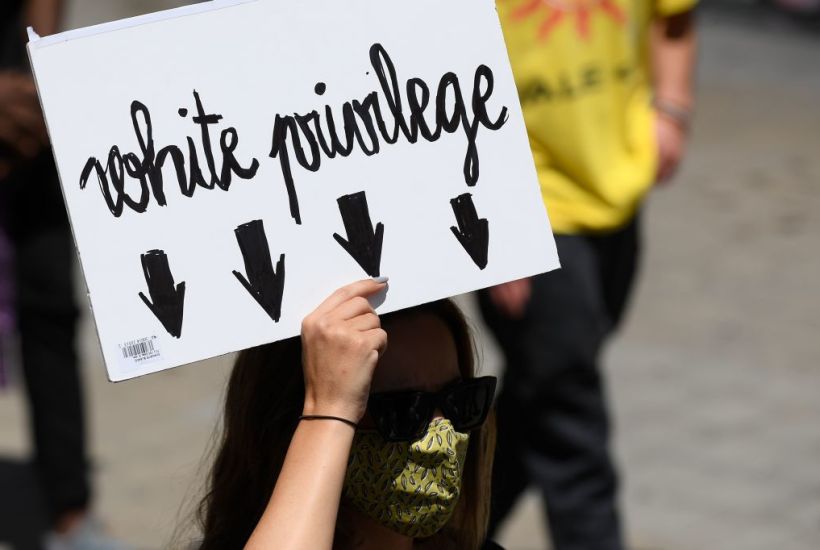First off the blocks criticising Dr Tony Sewell’s report of the Commission on Race and Ethnic Disparities was Professor Kalwant Bhopal from the University of Birmingham. Writing in the Guardian and focusing on her specialism of education (she is director of the Centre for Research in Race and Education), she took exception to the statistics that showed the majority of ethnic minority groups ‘perform better than White British pupils’. If this were true, of course, it would put to bed the whole idea of institutional racism in education and ‘white privilege’, for it wouldn’t be a racism worth its salt if whites systematically came bottom or near-bottom.
In her tweets about the report she guides us back to her latest book, White Privilege: The myth of a post-racial society, for evidence of the reality of how white privilege works. Amongst other evils, it leads to ‘low educational attainment’.
The extraordinary thing is, however, that the data she presents in her book lead precisely to the same conclusion as that of Dr Sewell’s report. The difference is, whereas Dr Sewell and his team followed the evidence where it led, Professor Bhopal appears to ignore it.
The educational attainment data she uses is from the Department for Education, one of the same sources used by Dr Sewell. Of the 18 ethnic categories that have been included, ‘White British’ comes in at 11th. There are even two other white groups (Traveller of Irish Heritage, and Gypsy/Roma) that come in even lower, at 17th and 18th. However, Bhopal suggests that these two white groups have ‘unacceptable or illegitimate forms of whiteness’, so she excludes them from consideration. Taking her lead and excluding these two severely underachieving groups, White British come in at 11th out of 16.
The White British are beaten in educational attainment by almost everybody. By the Chinese and Indians, by Bangladeshi, Mixed White/Asian and ‘other Asian backgrounds’, by Black Africans and Mixed White/Black African.
Professor Bhopal shows all of this in a neat chart, but very oddly this finding does not merit any further discussion. Nowhere else are these facts taken up, there is no discussion of what they imply. The narrative continues about BAME disadvantage, even though the data that she has given shows largely the opposite. British education policy, she writes, ‘has marginalised and alienated black and minority ethnic communities’. Education policy has, ‘at its core’ a ‘privileging of white ethnocentric identity, designed to marginalise and exclude black and minority ethnic groups’. It’s a very strange phenomenon, this white privilege that leads to depressed educational attainment of whites.
Some of the commentary around the Commission’s Report suggests that things were different in the past, and that we can congratulate ourselves on how Britain has improved. This does not appear to be so regarding educational attainment, however. Going back 35 or 40 years, perhaps when Professor Bhopal was at school, the available evidence shows the same story.
The Rampton Report, (the ‘Interim report of the Committee of Inquiry into the Education of Children from Ethnic Minority Groups’) released in June 1981 only had three categories for educational attainment, ‘West Indians’, ‘Asian’, and ‘all other leavers’ (predominantly the white population). Children of Asian origin came top, both in terms of obtaining five or more higher grades at O level or equivalent, and for gaining one or more A levels. The Inner London Education Authority (ILEA) disaggregated further by ethnicity. In 1986, ILEA used 11 ethnic categories. White British came 8th out of 11, outclassed by children of Indian, Pakistani, South-East Asian, Greek, African, Irish and Arab background. There may have been problems of racism back then, of course, but they didn’t apparently translate into low educational attainment.
Professor Bhopal begins her book with a ‘personal note’. Her parents ‘came over from India to England over 50 years ago for a better life’, she writes. The fact that Professor Bhopal has been a visiting professor at Harvard, Kings College London and UCL, as well as holding her tenured chair at a leading Russell Group university, seems to be marvellous tribute to her parents’ leap in the dark all those years ago.
‘My four children give me so much hope’, she continues. ‘They continue to tell me how much more accepting and inclusive their generations are of difference, and that in the future people will no longer be judged by the colour of their skin. I hope they are right’. From the evidence of Dr Tony Sewell’s report, it seems they may well be.
<//>
Got something to add? Join the discussion and comment below.
Get 10 issues for just $10
Subscribe to The Spectator Australia today for the next 10 magazine issues, plus full online access, for just $10.




















Comments
Don't miss out
Join the conversation with other Spectator Australia readers. Subscribe to leave a comment.
SUBSCRIBEAlready a subscriber? Log in